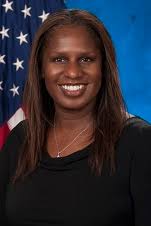WASHINGTON, DC — For a VA physician, it can be a challenge to figure out the best treatment plan for a patient and implement it, and the victory comes when the veteran’s health and quality of life is improved.
What happens when you take those lessons you learned and apply them to a hospital? Or to the entire VA healthcare system? How big are the challenges and how satisfying the victory?
That has been the trajectory of the 24-year career at VA for Erica Scavella, MD. The VA chief medical officer has had a near-exponential scaling up of responsibility, coinciding with a similar scaling in her potential impact on veterans. But with each new step, her central goal has remained that of figuring out what VA is doing right and what it’s doing wrong, and adjusting accordingly.
Scavella began her career in 1999 as a primary care physician at the Baltimore VAMC, but even then she was thinking bigger.
“I made a decision that I wanted to try to focus on my patients and what I could do to make an impact for them,” Scavella said. “But one patient at a time wasn’t efficient enough. I was always trying to do more than one thing at once.”
To that end, as a physician, Scavella began working with the quality improvement office at the VA Maryland Healthcare System, helping find ways to sort through VA’s data and see the full landscape of the VISN’s patient population.
“We wanted to break down that data to see if we were managing them appropriately,” Scavella explained.
Was VA implementing all the best practices to protect against or combat diabetes? Did patients with diabetes have their blood pressure and cholesterol under control?
“These types of things led me into the realm of quality, and quality is such a large, expansive area,” Scavella said. “Not only was I getting involved with patients who I would normally see, but projects for surgery or mental health, as well. And it opened my eyes to how we could do things better and differently.”
In 2010, she accepted a job as a senior medical investigator at VA’s Office of the Medical Inspector (OMI). The OMI is VA’s in-house office tasked with investigating healthcare issues raised by veterans and other stakeholders. For someone who wanted to make as big an impact as she could, it was a natural progression.
“The most interesting cases were the ones where we could see that there were a set of concerns and that, by coming in and us doing an investigation and bringing it to light, we made an impact,” Scavella said.
She also learned a lot of new skills, ones she’d never had to think about when she was working with patients and raw data.
“How do we get information from people in a way that they feel safe to speak up and disclose? When we show up to do an investigation, it’s usually not that facility or that leader’s best day. We’re coming to do something, looking into whether they made a mistake or not,” Scavella explained. “Be kind and don’t be disrespectful. It’s important to show compassion and humility when you’re working with groups to get to what actually happened.”
In 2017, Scavella became the interim VA medical inspector—a role that became permanent the following year. From that vantage point, she was able to see that OMI’s role wasn’t just to investigate errors in VA care, but to challenge how people thought fixing the problem actually looks like.
“Our biggest issue when moving forward with these types of things is constantly being asked: Who is held accountable, and who will be punished or reprimanded?” she said.
She explained that rarely are incidents the result of malfeasance or neglectful disregard on the part of a staff member. Usually it is a confluence of small, innocuous decisions that lead to something going wrong.
She used the extreme but simple example of a surgical team operating on the wrong leg of a veteran. It sounds like an egregious error on the surgeon’s part, but it was likely a combination of factors.
“Perhaps the room was set up differently. Perhaps someone reversed the room,” Scavella explained. “So many small things happen in procedures that lead to a mistake, and [providers] start making assumptions.”
The goal, Scavella stressed, is not to find a person to punish, but to identify how an issue developed and how to prevent it going forward, not just at that facility but throughout VA.
“It’s a cultural shift that a lot of healthcare leaders understand, but a lot of non-healthcare employees don’t understand,” Scavella said. “They see it as you made a mistake, and you should be punished for it.”
VA also needs to develop a culture where staff can speak up at the moment when they see something wrong, she said. For example, the student who spent the most time with that patient and knows it’s the wrong leg—even if they’re the youngest, least-experienced person in the surgical suite—needs to feel comfortable raising their hand.
In 2021, Scavella made another leap, this time to associate deputy under-secretary and then, a year after that, landed in her current job as chief medical officer. In that role, she is responsible for setting policy decisions for all VA facilities and working to implement new legislation that impacts medical centers, as well as a host of other duties.
“I think the majority of my time is spent on understanding what issues are affecting our clinicians; establishing policy; understanding impacts of new policies on the field; also making sure I have input from veterans and VSOs as we move forward on different things,” she explained. “I spend a lot of time interacting with the Hill on legislation, how we’re doing, understanding whether something is feasible.”
These days, that means a lot of work implementing the PACT Act, as well as legislation focusing on expanding things like mental healthcare treatment and breast cancer screening.
It is, she admitted, the same work she was doing back in Baltimore—making sure that the best possible care is provided to all veterans who could benefit from it. But now she has the additional responsibility of inviting more veterans into that circle.
“We want to open the aperture for more veterans to come in for care,” she declared.
As for where her next leap will take her, Scavella says she’d be content to settle into the role of chief medical officer for a while.
“ I have a great team I’m working with and for. We push the needle on things. We have good and hard conversations on things,” she said.
As for the future, she added, “I don’t foresee leaving this department until I’m eligible for retirement. And maybe not even then.”


